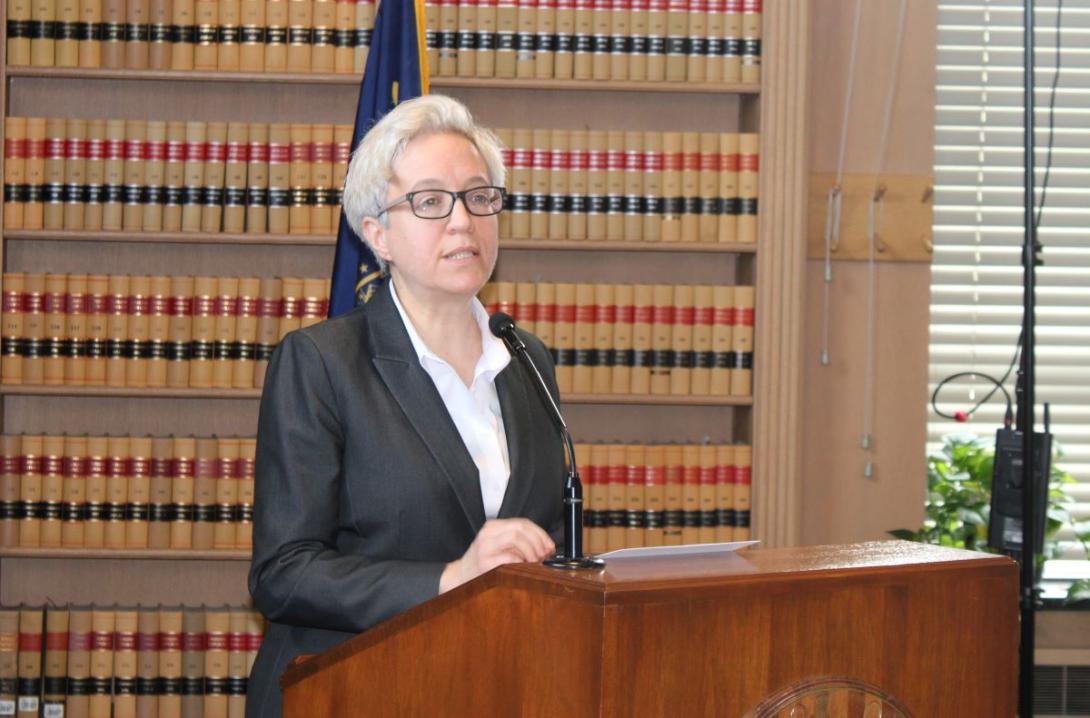
This article has been updated to incorporate additional reporting.
Newly released Oregon Health Authority emails provide details of First Lady Aimee Kotek Wilson’s involvement with the agency, showing that she considered herself a full-fledged member of the governor’s behavioral health “team” — and was treated as one, too.
While the emails contain no obvious bombshells, they highlight the challenging situation created when governor’s spouses in Oregon want to help address problems and use their position to influence state policy. The records also make clear that within three months of the new governor taking office Kotek Wilson had become the functional equivalent of a public employee —albeit an unpaid one — who used Kotek's clout to spearhead specific policy direction.
For instance, after a meeting in March 2023, she expressed her opinion that the Oregon State Hospital should resume working with a specific Portland nonprofit to provide services to patients after leaving the Oregon State Hospital using an approach called DBT, or dialectical behavioral therapy.
“Team,” she wrote in an email addressing state Behavioral Health Director Ebony Clarke and Kotek’s then-staffer Annaliese Dolph. “I would love to get the DBT institute working with folks coming out of the state hospital again … It’s a perfect opportunity to see the program succeed in real time, and then make decisions about how or if it makes sense to broaden it out. Thoughts?”
“Agreed,” Dolph responded, adding that she would follow up with the person in charge of the state hospital, then-Superintendent Dolores Matteuci.
In March, when three top Kotek aides including her chief of staff, Andrea Cooper, suddenly left the office, Oregon Public Broadcasting first connected their departures to personality conflicts with Kotek Wilson. Later that day, Willamette Week reported that Cooper had concerns about the First Lady’s role in state government.
A month later, the state disclosed emails under Oregon Public Records Law showing one of the departed top aides had criticized Kotek and Kotek Wilson for a “highly inappropriate” effort to use the governor's power to intervene in an internal workplace dispute at a government contractor on behalf of a friend of Kotek Wilson's who worked there.
The revelations have come as the state faces a major crisis in behavioral health. The revelations are significant, in part, because Kotek’s handling of the situation — including her failure to earlier disclose and define the First Lady’s policy role— has sparked concern that the backlash could undermine the first-term governor’s momentum in tackling the crisis.
“We’ve lost our spokesperson,” said one behavioral health advocate who is familiar with Kotek Wilson’s role, speaking on condition of anonymity. “The question now is how much damage is going to happen. Who’s going to stand up in the governor's office and say ‘I’m going to champion behavioral health’ now?”
State law, along with state agency policies and court decisions, make clear that volunteers actively involved in Oregon government must follow the same ethics and public records laws as any public employee.
After the news broke that Kotek had ousted employees who’d questioned the lack of clarity around Kotek Wilson’s role, the governor announced she would seek guidance from the Oregon Government Ethics Commission. Asked about the situation, a Kotek spokesperson emailed a statement to The Lund Report alluding to the fact that no evidence has surfaced of Kotek Wilson accepting outside payment that would represent a financial conflict of interest.
“The question now is how much damage is going to happen. Who’s going to stand up in the governor's office and say ‘I’m going to champion behavioral health’ now?”
“The First Lady requested to participate in staff onboarding provided to all Governor’s staff, despite the lack of guidance for First Spouses acting as a volunteer,” the spokesperson said.” As the conversation with Oregonians about the role of the First Spouse evolved, a decision was made consistent with the recent announcement the Governor’s Office will await guidance from the Oregon Government Ethics Commission regarding the role of the First Lady prior to completing onboarding materials.The Governor’s Office handles conflicts of interest consistent with Oregon law. First Lady Kotek Wilson has not given notice of an actual or potential conflict of interest”
The spokesperson pointed to a May 1 press conference in which Kotek was noncommittal about her spouse’s future role in policymaking. Kotek told reporters she was “committed to defining the role of the First Spouse with respect to what we learn from the Oregon Government Ethics Commission, not only on behalf of this administration but future administrations as well.”
“Between now and when we learn more from (the Oregon Government Ethics Commission) OGEC, here's what the First Lady will do: the First Lady will continue to accompany me and attend events representing the Governor’s Office, such as Tribal visits and ceremonial events,” Kotek said.“And she will listen to Oregonians about the issues most impacting them, especially in the area of mental health and addiction.”
‘First Aimee’

The emails show Kotek Wilson communicating not just with high-level officials in the Kotek administration, but state-hired consultants such as Deloitte as well as leaders of nonprofit organizations. She signed her emails as “First Aimee.”
In May 2023 Kotek Wilson emailed Clarke as well as Kotek and Andrea Cooper, the governor’s then—chief of staff, referencing a 2019 Multnomah County audit on the county’s ability to serve adults with serious mental illness.
“It has helpful background and some good recommendations,” wrote Kotek Wilson. “Not sure how to use it yet but think it can be helpful in our work. Perhaps we share with Deloitte?”
In November 2023, Kotek Wilson wrote to Clarke and Juliana Wallace, the governor’s behavioral health initiatives director. She raised the idea of meeting with the Portland chapter of the National Association of Social Workers to discuss racial disparities in connection with a national licensing exam.
“I know the NASW has been vocal about the exam creating barriers for social workers of color entering the practice. It is an important conversation I think particularly in Oregon since all, but two Oregon counties are designated as complete mental health professional shortage areas by the federal government,”she wrote.
Kotek Wilson wrote that she wanted to better understand what the association was planning and that she had previously spoken with Oregon Sen. Ron Wyden and U.S. Rep. Andrea Salinas about the topic while in Washington D.C.
Wallace wrote back, “First Lady. I think that’s a great idea! Let me know what you learn.” She noted that Oregon had considered creating its own test.

Clarke, however, didn’t embrace that idea, writing that it might create more work for Oregon Board of Licensed Social Workers. She added, “It is going to take strong advocacy and innovation to address this issue, and I’m happy to be a thought partner on this.”
Kotek Wilson responded that she would connect with Delmar Stone, the head of the Oregon chapter of the National Association of Social Workers.
In February Kotek Wilson emailed Wallace and Clarke writing that Leslie Fox, an advocacy director with Janssen pharmaceuticals, a subsidiary of Johnson & Johnson, had “interesting data” regarding the company’s “Schizophrenia Ecosystem tool.” In a previous email, Fox wrote to Kotek Wilson about how “long acting injectables” could help people with serious mental illness. Such medications, sold by Janssen, are a response to the fact that getting some psychiatric patients to take schizophrenia or antipsychotic medications can be a challenge, and failure to take them can cause those patients' health to deteriorate significantly.
Clarke wrote back that she was interested in the data and suggested setting up a Zoom call.
Records also show that Kotek Wilson was included on emails from the Oregon chapter of the National Alliance on Mental Illness regarding a work group to propose changes to Oregon’s civil commitment laws.
In February, Kotek Wilson forwarded an email to Clarke, Wallace and the governor from Katie O’Brien, the executive director of Portland day shelter Rose Haven. O’Brien wrote that it had been about 10 months since the governor and Kotek Wilson had visited the shelter and she was now reaching out to raise alarms about kratom, a plant native to southeast Asia that’s been used in herbal medicine and has drawn concern over its potential health risks.
“I am reaching out in hopes to bring attention to a crisis mounting in our country around kratom, a highly addictive and deadly herbal extract,” O’Brien wrote. “It is marketed as a supplement that is an energy booster, mood enhancer, pain reliever and antidote for opioid withdrawal. It is growing rapidly in popularity in the US and is not regulated.”
O’Brien urged the governor to “consider how we get kratom out of the state of Oregon, advocate for its regulation and keep our children safe.”
Clarke responded that she would ask her team what the state could do regarding kratom.
Gov. Kotek weighed in personally, writing that her predecessor, Kate Brown, had vetoed a bill regulating kratom with the assumption that the federal government would step in.
“Not sure that’s happened,” wrote Kotek. “The problem with bill was who would manage the regulation.”